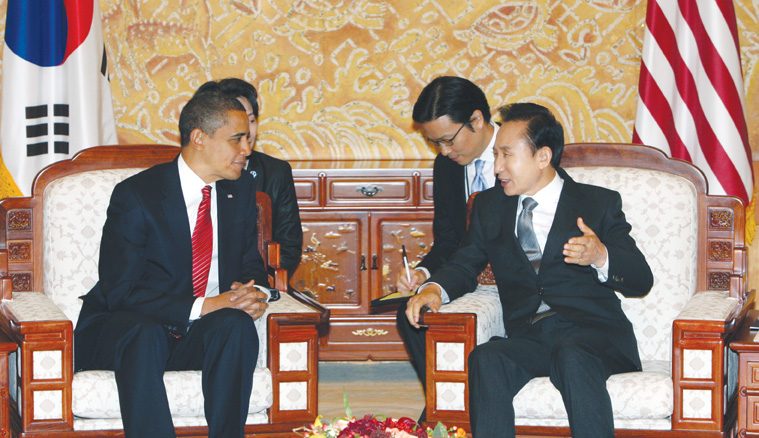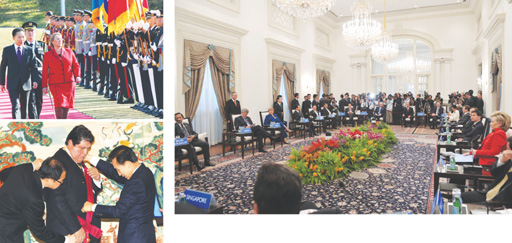ROK, U.S. Join Hands on NK Issue
Korean President Lee, U.S. President Obama cement mutual ties

President Lee Myong-bak and his U.S. counterpart Barack Obama concurred on the need to take joint measures in coping with the brewing North Korea nuclear standoff via the ¡°grand bargain¡± approach. During a summit held in Seoul on Nov. 19, they also agreed to make combined efforts to bring the prickling North Korea to the dialogue table with the aim of settling the nuclear issue.
President Lee first came up with the ¡®grand bargain¡¯ initiative when he visited New York in September, prior to his attendance of the third G20 summit held in Pittsburgh.
Different from the ¡®package deal¡¯ ¡ª South Korea¡¯s traditional one-sided form of assistance to the North ¡ª the ¡®grand bargain¡¯ is more about give and take between the two, according to Cheong Wa Dae. Once North Korea dismantles its nuclear program in a verifiable manner, South Korea will guarantee security and economic assistance to the country in a concrete way, the presidential office explains. ¡°U.S. President Obama and I expressed satisfaction over the fact that South Korea and the U.S. are maintaining closer coordination than at any other time in dealing with North Korea and its nuclear programs. We have reconfirmed our unwavering commitment to a complete and verifiable dismantlement of North Korea¡¯s nuclear programs through the Six-Party Talks,¡± President Lee said at a joint press conference with the U.S. president following their summit.
President Lee also expressed his desire for North Korea to accept the ¡°grand bargain¡± proposal to ensure its security and to help improve the living standards of the North Korean people. The two leaders reaffirmed the solid Korea-U.S. security readiness and concurred on the need to substantially implement the Joint Vision for the Alliance adopted at the June Korea-U.S. summit, according to Lee. The foreign ministers of the two countries will meet next year, the 60th anniversary of the start of the Korean War, to discuss concrete plans to foster the Korea-U.S. alliance, Lee added.
The leaders highly praised the results of the G20 Summit held in Pittsburgh and promised to work together for the success of the G20 Summit slated for November 2010 in Korea. They also agreed to respond jointly to such international issues as climate change, green growth, nuclear nonproliferation and counter-terrorism efforts. Reiterating the economic and strategic significance of the Korea-U.S. FTA, the two presidents agreed to work together to expedite the ratification progress of the agreement.
President Obama, who arrived in Seoul onWednesday, Nov. 18, returned home after a luncheon with President Lee and a meeting with U.S. soldiers stationed in Korea.
¡°I would like to join the people of the Republic of Korea in extending our warmest welcome to President Obama. We know how much he appreciates Korean and Asian cultures and we are delighted to welcome him on his first visit to Korea. I believe that President Obama¡¯s global leadership, based on mutual interests and mutual respect, will help bring new changes to the United States and better serve peace and prosperity throughout the world. ¡°Having held three summit meetings with him and having met many times in various multilateral settings over the past 10 months, I can say we have indeed become very close friends. Our discussions today have been particularly in-depth and fruitful. ¡°We shared the view that the relationship between our two countries stands stronger than ever, and we agreed to consult on specific ways to continue moving such relationship forward.
Lee¡¯s Summit Diplomacy
In a brisk bit of summit diplomacy, President Lee has been busy meeting with top leaders of many major nations in a bid to pave the way for Korea to make a leap forward based on the friendly and cooperative relations with them. Lee went abroad 11 times this year to meet other heads of state and the representatives of Korean communities and business people in their regions. In all, he traveled to 16 nations, visiting some more than once such as the United States and Thailand. He logged 190 hours in flight, or eight days, covering 92,000 miles (149,000 km). The distance is comparable to traveling around the world four times.
His overseas trips lasted one day to a week and averaged four days. Besides the G20, APEC and other international meetings, President Lee managed to fit in 38 summits. Foreign leaders included the heads of major powers around the world ¡ª the United States, Japan, China and Russia ¡ª and heads of smaller Asian and European countries that hold considerable potential for commercial and cultural exchanges.
Cheong Wa Dae officials refer to the trips as physical training since the president and his aides often return home late on Sunday but begin work as usual on Monday.
Embracing Asia, Advancing Globally
Last April, at the second G20 Financial Summit in London, President Lee proposed abolishing trade protectionism and extending liquidity to emerging economies, playing an active role in proposing various alternatives to overcome the global economic crisis while working closely with the UK and Brazil.
The discussions prompted by Korea played a considerable part in obtaining an agreement at the G20 meeting, and Lee¡¯s assertion that the world needs to coordinate macroeconomic policy to jointly overcome the crisis was incorporated into the final statement. Korea even won the right to host the next G20 Financial summit in 2010.
Meanwhile the President has also made efforts to widen the scope of Korea¡¯s diplomacy, closely embracing outlying Asian countries. Asia¡¯s potential is immense: The region makes up 52 percent of the world¡¯s population, one-fifth of its GDP ($10.7 trillion) and one-fourth of its total trade volume.
One example of this Asian initiative is Korea forging a strategic partnership with Vietnam. The government hopes to conclude free trade agreements with every Asian nation and serve as a linchpin for regional FTAs.
President Lee is also known for enhancing cooperation in the fields of energy and low-carbon green growth. Lee¡¯s work with Australia, New Zealand, Sweden and other countries marks important developments in the renewable energy sector. Korea¡¯s low-carbon, green-growth policy was also promoted at the G20 Summit in Pittsburgh and the extended G8 Summit in Italy. Measures against climate change and in support of food security were also actively addressed by President Lee in Italy this summer.
Additional focus was given to bilateral agreements on energy and resources. Last year, Korea¡¯s self-development rate for petroleum and gas recorded 5.72 percent, going slightly over its initial goal of 5.7 percent. The government also expects little problem reaching this year¡¯s goal of 7.4 percent. The president¡¯s resolve to develop Korea¡¯s energy independence is also reflected in his future goals: 9.1 percent self reliance for 2010, 13.9 percent in 2011 and 18.1 percent in 2012.
However, close relations with the U.S. remain vital. In Lee¡¯s earlier meeting with Obama, the two leaders agreed to maintain strong, cooperative ties to resolve North Korean issues, jointly overcome the global financial crisis and counter climate change, among others.
Refined Diplomacy
President Lee¡¯s diplomatic advances are often attributed to his past experience as a CEO. He appears quite casual engaging other leaders, whether at a dinner party or standing together at a podium for a press conference. He has invited the president of Kazakhstan to a traditional sauna, asked the Australian prime minister over to his residence late at night and volunteered to personally guide the leaders of Cambodia and Uzbekistan around the country. President Lee is also reputed to be thorough in preparing for summits, asking his aides a barrage of questions and even calling for rewrites while in flight. Pragmatism stands at the core of President Lee¡¯s diplomacy. By tearing down unnecessary barriers and actively suggesting win-win measures, he seeks practical breakthroughs.
At the 17th APEC Summit meeting held in Singapore, during the second session on Sunday (Nov. 15) titled ¡°Retreat II: Connecting the Region,¡± Lee engaged in in-depth exchanges with world leaders on the global economy and the reforms that should come after overcoming the crisis.
The leaders of the APEC member economies agreed on the importance of keeping up global coordination to overcome the economic crisis and pursuing stable and sustainable growth for the future. The leaders also shared their views on pursuing inclusive growth that include the establishment of a social safety net and strengthening free trade through support of open markets and a speedy conclusion of the Doha Development Agenda among others. At the end of the session, a special statement for a new growth paradigm for the Asia-Pacific region in the 21st century was adopted, linked with the 2009 Statement for the APEC summit. The statement confirmed a new growth paradigm for the future that is balanced, inclusive and sustainable. It also expressed support for open markets and multilateral trade that should, behind and across borders, reconfirm the Manila Framework that forms a basis for Economic and Technical Cooperation in the region (ECOTECH) and promised to explore the possibility of free trade within the wider Asia Pacific Region (FTAAP: Free Trade Area of the Asia Pacific Region) by late 2010.
After wrapping up his discussion with Stephen Harper, the Prime Minister of Canada, President Lee elaborated on agendas to be pursued at next year¡¯s G20 Summit meeting, in line with the request of Singapore, the hosting nation of this latest APEC meeting. Korea was selected as the hosting nation of the G20 Financial Summit meeting in fall 2010.
Lee stressed the importance of the items agreed upon at the G20 meeting in Pittsburgh in September, such as international coordination over an exit policy and the prevention of trade protectionism. He emphasized that Korea would be attentive to the voices of both developing nations and the emerging economies and therefore play the role of a bridge between APEC and the G20 nations. President Lee emphasized that the vision of the G20 Financial Summit would not only benefit its member nations, but the whole world, setting up a basis for cooperation between the G20 summit and APEC nations. nw
Korean President Lee Myung-bak and U.S. President Barack Obama hold a meeting at Cheong Wa Dae on Nov.19.
Leaders attend a declaration ceremony at the close of the APEC Summit on Nov. 15.
(clockwise) President Lee Myung-bak and visiting Chilean President, Michelle Bachelet reviews ah honor guard at an official welcoming ceremony on Nov. 11. President Lee and other leaders participate in the APEC Summit on Nov. 15. The Korean president decorates the Honorary Order to Peruvian President on Nov. 12.
Photo by courtesy of the MCST
3Fl, 292-47, Shindang 6-dong, Chung-gu, Seoul, Korea 100-456
Tel : 82-2-2235-6114 / Fax : 82-2-2235-0799